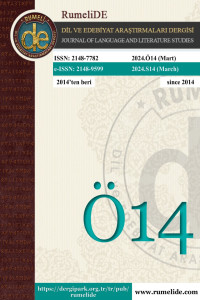Abstract
References
- Arberry, A. J. (1946). el-Musteşriḳûne’l-Biriṭaniyyûn, (Çev.: Muhammed ed-Dusûgî en-Nuveyhî), Londra.
- Bakırcı, S. (2003). “Arap Şiirinin İntikalinde Dini ve Ahlaki Değerlerin Rolü” EKEV Akademi Dergisi, Yıl: 7, Sayı: 15, Bahar.
- Bedevî, ‘A. (1979). Dirâsâtu'l-musteşriḳîn ḥavle ṣıḥḥati'ş-şi‘ri'l-Câhilî, Dâru'l-‘İlim li'l-Melâyîn, Beyrut.
- Brockelmann, C. (1970). Târîḫu'l-edebi'l-‘Arabî (GAL), çev. Abdulhalîm en-Neccâr, Dâru'l-Meârif, Kâhire, VI.
- Cubûrî, Y. V. (1997), el-Musteşriḳûn ve'ş-şi‘ri'l-Câhilî beyne'ş-şekki ve't-tevs̱îḳ, Dâru'l- Ḡarbi'l-İslâmî, Beyrût, 1.
- Çetin, N. (1973). Eski Arap Şiiri, İstanbul Üniversitesi Yayınları, İstanbul.
- Elmas, M. (2015) “Cahiliyye Şiirinin Gerçekliği Üzerine: İntihâl”, IV. Türkiye Lisansüstü Çalışmaları Kongresi-Bildiriler Kitabı IV, 14-17 Mayıs 2015, Kütahya.
- Gran, P. (1987), “el-İstişrâḳu’l-mu‘âsır fi’l-Vilâyâti’l-Mütteḥide”, el-İstişrâk, 2. sayı, Bağdat.
- Hüseyin, T. (2012). Cahiliye Şiiri Üzerine, (Çev.: Şaban Karataş), Ankara Okulu Yayınları, Ankara.
- Keyrevânî, İbn Reşîḳ. (1972). el-‘Umde fî meḥâsini'ş-şi‘r ve âdâbihi ve naḳdihi, I-II, nşr. M. Muḥyiddin ‘Abdu’l-Ḥamîd, Beyrût.
- Margoliouth, D. S. (2004). Arap Şiirinin Kökeni, (Çev.: Nurettin Ceviz), Aktif Yayınevi, Ankara.
- Özsoy, N. (2019), Bir Zâhid-Âlim Olarak Fuat Sezgin, Social Sciences Studies Journal, 5(51), s. 6931-6937.
- Sancak, Y. (1999). Hz. Peygamber Devrinde Şiir, Şafak Yayınları, Erzurum.
- Sezgin, F. (1984). Muḥâdarât fî târîḫi’l-‘ulûmi’l-‘Arabiyye ve’l-İslamiyye, Frankfurt.
- Sezgin, F. (1993), “Orijinallik ve İntihal Arasında Eski Arap Şiiri”, trc. H. Taşdelen, Uludağ Üniversitesi İlahiyat Fakültesi, 5(5), s. 311-316.
- Sezgin, F. (1991), Târîḫu’t-turâs̱i'l-‘Arabî, çev. Maḥmûd Fehmî Ḥicâzî, Câmi‘atu'l-İmam Muḥammed b. Su‘ud el-İslâmî, Riyad, VIII.
- Şakir, M. M. (1977), Kitâbu’l-Mutenebbî, Ḳâhire.
- Tekin, S. (2020). “Cahiliye Dönemi Arap Şiirinin Gerçeklik Tartışmalarına Fuat Sezgin’in Yaklaşımı”. Uludağ Üniversitesi Fen-Edebiyat Fakültesi Sosyal Bilimler Dergisi, 21(39).
- Yalar, M. (2008). "Cahiliye Şiirinin Tarihsel Gerçekliği Problemi", Uludağ Üniversitesi İlahiyat Fakültesi Dergisi, 17(2).
An Analysis of Orientalist Approaches to Pre-Islamic Poetry From the Perspective of Prof. Dr. Fuat Sezgin
Abstract
This article focuses on the pre-Islamic Arabian Jahiliyya period and the significance of the poetry from this era. The Jahiliyya period is considered a reflection of the pre-Islamic Arabian society and culture. The poetry from this period addresses societal, cultural, religious, and emotional themes, laying the foundation for Arabian literature. The poetry of the Jahiliyya period typically revolves around themes such as praise, criticism, yearning, love, heroism, and courage, while also touching upon the beliefs of the time. These poems serve as a rich reflection of Arabian culture and are regarded as crucial sources in Arabic Language and Literature, Arabic Rhetoric, and Islamic sciences. Orientalists, in their exploration of Jahiliyya period poetry, have produced works based on their own perspectives and methodologies. However, some Orientalists, particularly those focused on Jahiliyya poetry, have raised concerns about potential plagiarism and fabrication. These criticisms have evolved from the early views of Theodor Nöldeke to the radical approach of D. S. Margoliouth and the stance adopted by Taha Hussein. Prof. Dr. Fuat Sezgin, possessing expertise in Classical and Modern Arabic literature sources, has argued for the originality of Jahiliyya poetry. Sezgin supports this claim by drawing upon classical and modern sources, while also critiquing the works of Orientalists. In this article, the reasons behind the suspicion of Jahiliyya poetry being plagiarized or fabricated are elucidated by examining the works of Orientalists. Furthermore, Sezgin's approach and methodology in asserting the authenticity of Jahiliyya poetry are analyzed.
References
- Arberry, A. J. (1946). el-Musteşriḳûne’l-Biriṭaniyyûn, (Çev.: Muhammed ed-Dusûgî en-Nuveyhî), Londra.
- Bakırcı, S. (2003). “Arap Şiirinin İntikalinde Dini ve Ahlaki Değerlerin Rolü” EKEV Akademi Dergisi, Yıl: 7, Sayı: 15, Bahar.
- Bedevî, ‘A. (1979). Dirâsâtu'l-musteşriḳîn ḥavle ṣıḥḥati'ş-şi‘ri'l-Câhilî, Dâru'l-‘İlim li'l-Melâyîn, Beyrut.
- Brockelmann, C. (1970). Târîḫu'l-edebi'l-‘Arabî (GAL), çev. Abdulhalîm en-Neccâr, Dâru'l-Meârif, Kâhire, VI.
- Cubûrî, Y. V. (1997), el-Musteşriḳûn ve'ş-şi‘ri'l-Câhilî beyne'ş-şekki ve't-tevs̱îḳ, Dâru'l- Ḡarbi'l-İslâmî, Beyrût, 1.
- Çetin, N. (1973). Eski Arap Şiiri, İstanbul Üniversitesi Yayınları, İstanbul.
- Elmas, M. (2015) “Cahiliyye Şiirinin Gerçekliği Üzerine: İntihâl”, IV. Türkiye Lisansüstü Çalışmaları Kongresi-Bildiriler Kitabı IV, 14-17 Mayıs 2015, Kütahya.
- Gran, P. (1987), “el-İstişrâḳu’l-mu‘âsır fi’l-Vilâyâti’l-Mütteḥide”, el-İstişrâk, 2. sayı, Bağdat.
- Hüseyin, T. (2012). Cahiliye Şiiri Üzerine, (Çev.: Şaban Karataş), Ankara Okulu Yayınları, Ankara.
- Keyrevânî, İbn Reşîḳ. (1972). el-‘Umde fî meḥâsini'ş-şi‘r ve âdâbihi ve naḳdihi, I-II, nşr. M. Muḥyiddin ‘Abdu’l-Ḥamîd, Beyrût.
- Margoliouth, D. S. (2004). Arap Şiirinin Kökeni, (Çev.: Nurettin Ceviz), Aktif Yayınevi, Ankara.
- Özsoy, N. (2019), Bir Zâhid-Âlim Olarak Fuat Sezgin, Social Sciences Studies Journal, 5(51), s. 6931-6937.
- Sancak, Y. (1999). Hz. Peygamber Devrinde Şiir, Şafak Yayınları, Erzurum.
- Sezgin, F. (1984). Muḥâdarât fî târîḫi’l-‘ulûmi’l-‘Arabiyye ve’l-İslamiyye, Frankfurt.
- Sezgin, F. (1993), “Orijinallik ve İntihal Arasında Eski Arap Şiiri”, trc. H. Taşdelen, Uludağ Üniversitesi İlahiyat Fakültesi, 5(5), s. 311-316.
- Sezgin, F. (1991), Târîḫu’t-turâs̱i'l-‘Arabî, çev. Maḥmûd Fehmî Ḥicâzî, Câmi‘atu'l-İmam Muḥammed b. Su‘ud el-İslâmî, Riyad, VIII.
- Şakir, M. M. (1977), Kitâbu’l-Mutenebbî, Ḳâhire.
- Tekin, S. (2020). “Cahiliye Dönemi Arap Şiirinin Gerçeklik Tartışmalarına Fuat Sezgin’in Yaklaşımı”. Uludağ Üniversitesi Fen-Edebiyat Fakültesi Sosyal Bilimler Dergisi, 21(39).
- Yalar, M. (2008). "Cahiliye Şiirinin Tarihsel Gerçekliği Problemi", Uludağ Üniversitesi İlahiyat Fakültesi Dergisi, 17(2).
Details
| Primary Language | English |
|---|---|
| Subjects | Arabic Language, Literature and Culture |
| Journal Section | World languages, cultures and litertures |
| Authors | |
| Publication Date | March 21, 2024 |
| Submission Date | January 19, 2024 |
| Acceptance Date | March 20, 2024 |
| Published in Issue | Year 2024 Issue: Ö14 |


